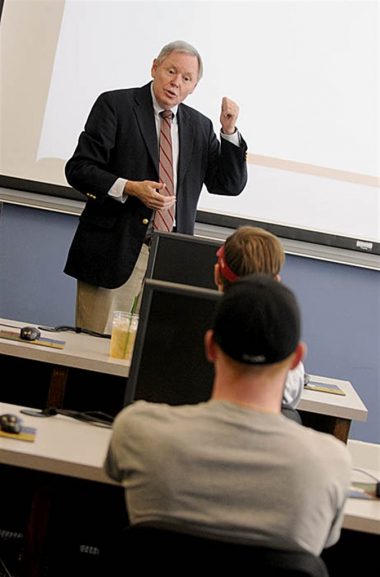Richard "Rick" Watson, the co-leader of a nonprofit effort to produce free electronic and print textbooks for students in the developing world, visited Elon on Monday to share his vision and to seek partnerships at the university with which to expand the Global Text Project.

“Students really like to do things that are of value to other people,” the University of Georgia professor said as he talked about the fleeting nature of routine homework and class assignments. “You don’t want your work to be thrown away.”
The project takes three approaches to creating its textbooks: having classes write them (by assigning chapters to individual student authors), obtaining the copyright to out-of-print books and then updating the material – and, in a few instances, purchasing the copyright for books still in print.
Books are then scanned and made available for download at universities in impoverished parts of the world, where, according to Watson, the price of one textbook can be as high as 20 percent of the average annual income for families in that nation.
“As you give people the capability to learn … they can go out and teach others,” he said.
For Watson, a self-described “true Southerner” as an Australian native, providing educational material brings dollar-to-dollar returns much higher than providing infrastructure or supplies. And he told the students on the third floor of Alamance on Monday that an education is the best way to raise someone out of poverty.
“The nice thing Rick brings to this is the bigger picture of global impact,” said Lynn Heinrichs, an associate professor of computing sciences and business administration, who leads the upper level course (CIS 320: “Building Collaborative Environments”) writing for the Project.
The Global Text Project started at the University of Georgia in 2004. Its current associate editor, Marisa Drexel, is a 2004 Elon University alumnus. “Elon has been really receptive to this,” Drexel said. “When I started work with the Project, I knew it was the kind of thing that Elon likes.”
For more information on the project, click on the link to the upper right of this page.


